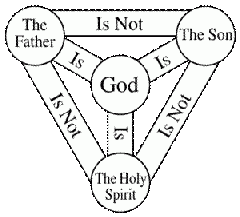(Image via Wikipedia)
Today, the understanding of God as a Trinity is under assault from many different directions including atheists, Muslims, liberal Christians, and even Mormons.
Many like Atheists call the doctrine incoherent at best. The problem is that many of these critics do not take the time to view all of the historical evidence and propositions written on the subject.
Here’s an excellent article by Peter S. Williams, presenting a detailed historical and philosophical case for the Trinity:
Unfortunately it is not ‘Trinity 101’ in 500 words or less but a very cogent and well documented advanced presentation. Well worth the time and effort to digest.
Here’s the short conclusion for a taste:
Critics accuse the Christian idea of God as Trinity of incoherence, but as Peter Kreeft argues:
The doctrine of the Trinity does not say there is one God and three Gods, or that God is one Person and three Persons, or that God has one nature and three natures. Those would indeed be self-contradictory ideas. But the doctrine of the Trinity says that there is only one God and only one divine nature but that this one God exists in three Persons. That is a great mystery, but it is not a logical self-contradiction.
Whatever the merits of the particular trinitarian model propounded herein, to believe in the Trinity is to believe in three co-eternal divine persons who together essentially constitute one divine personal being, and this doctrine is not logically incoherent.
Far from being the liability to Christianity that critics assume, the doctrine of God as Trinity is supported by a posteriori and a priori arguments that demonstrate the shortcomings of Unitarian theologies and which lend weight to the conclusion that Christian theism is the best worldview available to us.
As theologians Pinnock and Brow state: “Loving is what characterizes God essentially… God is not a solitary monarch but a tripersonal mystery of love.”
This is one of the best and among the most complete studies on the Trinity that I have ever seen in one article. Even more comprehensive than some many systematic theology treatments. It covers theological and philosophical questions along with many historical pronouncements along the way. Well worth the time for a serious theological student.
